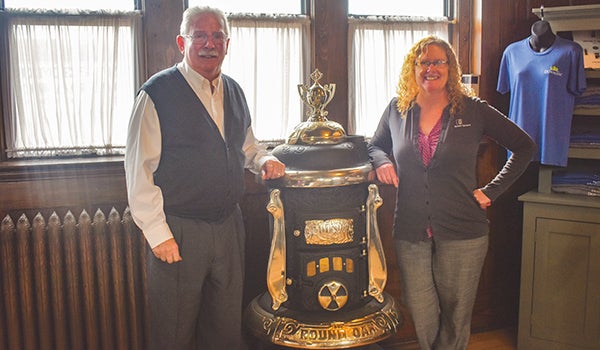Lunch and Learn event focuses on health insurance
Published 8:47 am Thursday, March 12, 2020
DOWAGIAC — A lunch was served with a lesson on health insurance at the Greater Dowagiac Chamber of Commerce’s second Lunch and Learn event Thursday.
Several business owners and business professionals from Dowagiac took an hour out of their schedules to join Dean Johnson and Patti Middleton-Badner, of Kemner Iott Benz, an independent insurance agency in Michigan with locations in Adrian, Ann Arbor, Cassopolis and Howell. Both Johnson and Middleton-Badner work at the Kemner Iott Benz office in Cassopolis, 60267 Century Dr.
The company’s mission is to provide insurance products and services to both individuals and businesses to protect their assets, according to Kemner Iott Benz’s website.
During the lunch and learn event, Johnson discussed the insurance options for business owners who are looking to sell their business due to retirement or to continue on to a new venture.
“Health insurance is an ever-changing industry,” Dean opened on Thursday.
He said changes like the Affordable Healthcare Act, enacted in 2010, required adults to have health coverage or pay a fine. Now penalties are gone, and adults are not required to pay into insurance.
Dean discussed how short-term health insurance was traditionally designed for people who would not have health insurance for 90 days, such as a person who was in between jobs or a college student on summer break.
“Short-term policies’ benefits are totally different under Obamacare,” he said. “There are preexisting conditions with those policies. People don’t understand that. They are buying these short-term policies for a year, and then they suddenly hit 50. They’ve probably had some heart issues, they may have had some cancer issues that are gone, but they are not going to cover that anymore.”
Dean cautioned people to look over short-term policies because they can be limited in coverage. He also added small business owners should look closely at faith-based policies.
Dean, who owned a factory in Indiana for a number of years, had Amish workers who decided to opt out of company health insurance and instead would contribute to healthcare as a group. When Obamacare started, more faith-based models popped up, Dean said.
“Instead of paying $1,000 to $1,500 a month for a small family, they’re depositing maybe $500 a month in this account,” Dean said. “Then the people that manage that account they take their 15 percent out. When something happens to you, you send your claim in, and if there is any money left in the pot, they pay it. If there isn’t any money, then they won’t pay it.”
Dean said there had been lawsuits about the promises unregulated faith-based models made.
When business owners get ready to retire or prepare to sell their business, Dean said insurance companies could enroll business owners ages 65 or older into Medicare, which can add cost savings.
He also discussed how to form a group health insurance program for a small business. To create a group, Dean said a company needs at least two people working at least 30 hours a week.
While speaking at the lunch and learn, Dean emphasized Kemner Iott Benz’s care for the community. He said the agency had been around for more than 100 years.
“When you call in there, you are talking to somebody who cares about you,” he said. “If they quit caring about you, then they go work someplace else.







